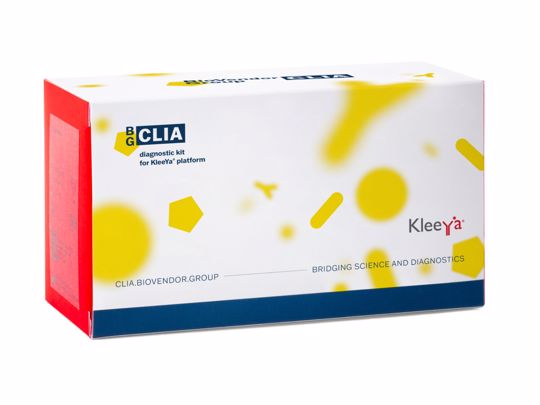CLIA Procalcitonin
Chemiluminescence kit for the detection of procalcitonin in human serum.
Chemiluminescence kit for the detection of procalcitonin in human serum.
| Catalog Number: | CL-PCT100 |
|---|---|
| Size: | 100 tests |
| Regulatory status: | CE IVD |
| Clinical topic: | Sepsis & Inflammation |
| Diagnostic panel: |
COVID-19 SIRS, Sepsis, and Severe Viral Infection |
| Producer: | TestLine Clinical Diagnostics s.r.o. |

Rising or elevated procalcitonin (PCT) level is a marker for severe bacterial infections, more specific than most other inflammatory markers (cytokines, interleukins, and acute-phase reactants). Normally, PCT is expressed in thyroid C-cells and its levels in circulation are very low. As a response to bacterial infection, PCT is secreted by many tissues in large quantity and its blood concentration rises rapidly. Only extremely severe noninfectious stimuli may elevate blood PCT concentrations.
Low background levels, fast response to a triggering event (detectable in 2-4, peaks in 12-24 hours), illness severity-related response, and the dependence of sustained PCT elevations on ongoing inflammatory stimuli make PCT a superior bacterial infection marker.
Early Detection of Sepsis
Sepsis is a life-threatening organ dysfunction that results from the body’s response to infection (Sepsis 3 definition 2016). To improve outcomes of patients with sepsis, it requires early detection and prompt clinical interventions. Fast and specific response of PCT to a bacterial infection makes it helpful for an early and accurate decision to initiate, escalate, and de-escalate therapy based on clinical assessment.
Bacterial Infection Identification and Antibiotic Therapy Management
In patients manifesting acute infection symptoms, the levels of procalcitonin clearly distinguish bacterial from viral infections and identify patients needing antibiotic therapy.
In acute respiratory tract infections, such as low respiratory tract infection (LRTI), community-acquired pneumonia (CAP), acute exacerbation of asthma or COPD, the use of procalcitonin is useful to initiate or discontinue antibiotics; this results in lower risks of mortality, lower antibiotic consumption, and lower risk for antibiotic-related side effects.
PCT measurement aids to differentiate between bacterial and viral meningitis and start with antibiotic treatment promptly. It is also used in the diagnosis of renal involvement in pediatric urinary tract infections.
COVID-19
From accumulating data and reports, that appears that elevated PCT levels on admission are associated with increasing COVID-19 severity and it has been addressed as a predictor of survival in patients with COVID-19. It can assist clinicians in formulating a tailored treatment approach and promptly provide intensive care to those who are in greater need. Monitoring of PCT aids to detect a secondary bacterial infection and its progression.
| Assay time | 17 min |
| Assay stability | 30 days on board stability / In use stability until the expiration date at storage temperature 2-8 °C |
| Sample matrix | Serum |
| Sample volume | 34 µL |
| Measuring range | 62,5 - 4000 ng/l |
| Assay/kit content | Reagent Cartridge with specific reagents for the assay, magnetic particles, calibrators |
| Complementary products | Anchor® Tips, Stackable Cuvette, KleeYa Trigger Pack, KleeYa Wash buffer |
| Note | The kits are CE-IVD certified and intended for professional use. |